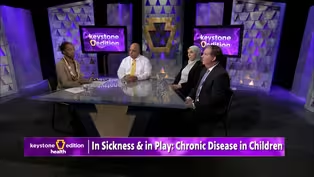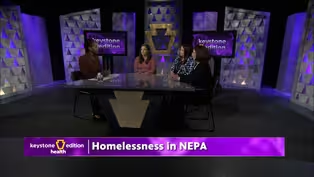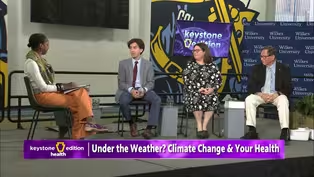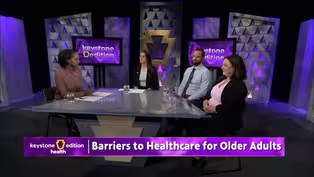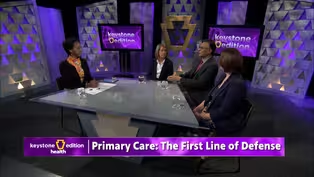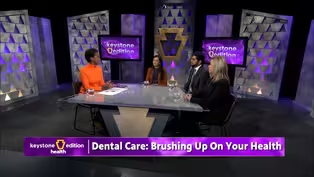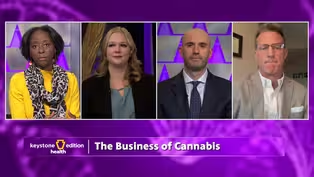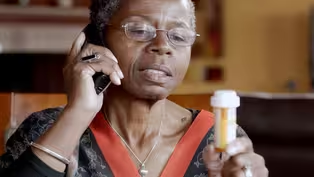Keystone Edition
Prescription Drug Costs
1/24/2022 | 26m 58sVideo has Closed Captions
How do drug costs impact those who rely on prescriptions in our area?
Prescription drugs can cost 2.5 times more in the U.S. than the same drugs in other Western countries, according to a recent study from the non-profit RAND Corporation. How do drug costs impact those who rely on prescriptions in our area, and what are local organizations doing to bring drug costs down?
Problems playing video? | Closed Captioning Feedback
Problems playing video? | Closed Captioning Feedback
Keystone Edition is a local public television program presented by WVIA
Keystone Edition
Prescription Drug Costs
1/24/2022 | 26m 58sVideo has Closed Captions
Prescription drugs can cost 2.5 times more in the U.S. than the same drugs in other Western countries, according to a recent study from the non-profit RAND Corporation. How do drug costs impact those who rely on prescriptions in our area, and what are local organizations doing to bring drug costs down?
Problems playing video? | Closed Captioning Feedback
How to Watch Keystone Edition
Keystone Edition is available to stream on pbs.org and the free PBS App, available on iPhone, Apple TV, Android TV, Android smartphones, Amazon Fire TV, Amazon Fire Tablet, Roku, Samsung Smart TV, and Vizio.
Providing Support for PBS.org
Learn Moreabout PBS online sponsorshipMore from This Collection
Healthcare is constantly changing as technology finds new and better ways to help people live longer, healthier lives. Host Tonyehn Verkitus will address the issues that are important to the people in our community, including the ongoing pandemic, concerns about vaccines, food deserts, childhood trauma and child abuse, mental health, environmental issues, and the rising cost of staying healthy wit
Domestic Violence: Breaking the Silence
Video has Closed Captions
Access to the right resources can make facing this challenge a little easier for families (26m 59s)
In Sickness and in Play: Chronic Disease in Children
Video has Closed Captions
About 25% of children in the US aged 2 to 8 years have a chronic health condition (27m)
Video has Closed Captions
Homelessness can happen to anyone at any age or socio-economic status. (26m 59s)
Video has Closed Captions
As we raise the visibility on Transgender young adults and embrace them within our culture (26m 59s)
Video has Closed Captions
Obesity is a serious risk factor many try to avoid when developing healthy eating habits. (27m)
School Nurses: Answering the Call
Video has Closed Captions
What can our school districts do to help retain and recruit nurses for future generations? (27m)
Under the Weather? Climate Change & Your Health
Video has Closed Captions
How does climate change impact individual and public health? (54m 59s)
Barriers to Healthcare of Older Adults
Video has Closed Captions
What progress have local organizations made in addressing these challenges? (27m)
Primary Care: The First Line of Defense
Video has Closed Captions
When was the last time you saw your primary care doctor? (27m)
The Smallest Victims: Child Abuse & Trafficking
Video has Closed Captions
What are the signs to know to spot child abuse and even possible trafficking? (27m)
Dental Care: Brushing Up on Your Health
Video has Closed Captions
How can providers make dental care more affordable and accessible? (26m 59s)
Video has Closed Captions
What does the cannabis industry mean for Northeastern and Central Pennsylvania? (26m 59s)
Providing Support for PBS.org
Learn Moreabout PBS online sponsorship- Live from your Public Media studios, WVIA presents, Keystone Edition Health, a public affairs program that goes beyond the headlines to address issues in Northeastern and Central Pennsylvania.
This is Keystone Edition Health, and now moderator, Tonyehn Verkitus.
- Good evening and welcome to Keystone Edition Health, I'm Tonyehn Verkitus.
Tonight we'll examine the reasons behind the rising cost of prescription drugs and how doctors, legislators, and advocates are trying to make prescriptions more affordable.
First, let's hear from WVIA's, Paul Lazar.
(swish sound) - [Paul] Taking prescription medications is a daily reality for many older adults or others with chronic illnesses, but that daily necessity has become a costly one in the United States.
A study by the RAND Corporation found prescription drugs can cost 2.5 times more in the US than in other western countries, significantly impacting those making regular trips to the pharmacy counter.
The US Congress has proposed new bills aimed at lowering the cost of prescription drugs and insulin, but while those laws are debated and refined, other organizations and programs like PACE work daily to help keep people on their necessary medications through assistance and price research.
For Keystone Edition Health, I'm Paul Lazar.
- Joining us tonight is Julio Ramos, rheumatologists and past President of the Luzerne County Medical Society, Tom Snedden, Director of PACE.
The pharmaceutical assistance program is with us via zoom.
Also with us via zoom tonight, we have Steven Kheloussi, Assistant Professor of Pharmacy Practice at Wilkes University.
Thank you all for being here.
So, let's jump right in.
Steven, can you tell us why prescription drugs are as expensive as they are?
- Aye, absolutely, thank you so much for having me.
So, the traditional reason why drugs cost as much as they do as written by pharmaceutical manufacturers, the ones who make the drugs, is that drugs cost a lot of money to develop and they really do, so, a brand new drug from the test tube to the patient could cost in the billions of dollars, and the reason for that is because it takes a lot of time and resources, there's the cost of failure, so, only one in every 5,000 new drugs actually makes it to the patient.
And then on top of that, there are these very high standards that the government puts in place through the FDA, rigorous tests are required and so forth, to make sure that the drugs that are getting to patients are effective and safe.
So, the cost of this innovation is really what drives a lot of that discussion normally.
But that's not to say that there's not cases of corporate greed.
So, a couple of years back there were situations with, if you've heard the name Martin Shkreli, who bought the rights to a drug and then raise the price up to $900 a tablet overnight.
And then also the cost of EpiPens rose significantly over a very short period of time, a few years back as well.
So, we have the innovation that we have to consider, and also a profit driven system that we have, but then we also have a system in place where the FDA and the US government ultimately, protects these medications with patents, which really limits the competition from entering the market for a significant period of time.
And then finally the drugs are often entering into the market based on their expected value, where we think about what is the benefit that this drug is going to bring, as opposed to the price of the alternative.
So, if you think about the cost of a heart attack, for instance, a heart attack is very expensive to treat, and so if you have a drug that can prevent a heart attack, then it's worth paying for that medication, even if it costs in the thousands of dollars.
- Tom, can you tell us how PACE covers drug costs for older adults and how this program is funded?
- Well, PACE program provides, comprehensive pharmacy coverage for older Pennsylvanians who meet the eligibility criteria for the program, and the program is made possible by the Pennsylvania law.
The program started in 1984, and the lottery has underwritten much of the cost of it.
Although I have to give some credit to pharmaceutical manufacturers who provide us with generous rebates on these costs, and also Medicare Part B, where we're able to offset some of our costs.
- Older adults on Medicare face high drug prices as well.
We spoke to Congressman Matt Cartwright to understand why.
- The big pharmaceutical industry inserted a provision in that law that said that, Medicare is not allowed to negotiate drug prices with pharmaceutical companies.
What?
They're not allowed to negotiate drug prices with pharmaceutical companies.
In other words, the pharmaceutical company gets to say how much they're gonna charge, and Medicare has to say, okay, that's why drug prices go skyrocketing.
A realistic view of the matter is that we have to address these skyrocketing drug prices, and the way to do it is to allow Medicare to negotiate.
- Steven, can you tell us what role insurance companies play in cutting cost of prescription drugs?
- There's actually a give and take with insurance, so, I didn't mention it earlier, but as that segment just Paul pointed out, there is a major role of insurance in actually raising drug prices in certain circumstances, because as the out of pocket costs for individuals fall, they're more likely to fill their medications, and as a result that increases the demand, which then ultimately increases the prices.
So, there's sort of this inverse relationship between insurance and drug prices to begin with.
So, our system does do a little bit of that, causing drug prices to go up, and so insurance kind of fights back by making sure that, the role of drug prices is not to prohibit patients from paying their medication costs and so forth, but instead to really just make sure that the most appropriate patients are getting treated with the most appropriate drugs, and so there's all sorts of tools that insurance companies use for that, and so for instance, if you look at quality within healthcare, insurance companies play a really important role in making sure that patients with diabetes, who are at risk for developing a heart attack or a stroke are treated with certain medications that will help lower that, and they'll do that by working with providers, working with pharmacies, working with patients even directly.
But one of the things that I think is more controversial, is the use of a tool called prior authorization, and so prior authorization is basically a double-check that the insurance company is gonna put in place to make sure that the patient is getting the best drug for their individual situation.
Now, you always trust your doctor, your provider for giving you that, but there is a lack of transparency amongst the insurance companies that really limits provider's ability in some certain circumstances to say, this is the drug that's going to be covered by your insurance, this is the drug that is going to be, the one that's gonna be most affordable for you.
And so, this is a way that health insurance companies can work together with your provider to make sure that the patient is getting the most cost-effective drug for their particular situation.
- Julio, I know that prior authorization is a huge topic for you.
Can you tell us what this process looks like on your end?
- Well, it can be a very tedious process, because every insurance company may have a different process that we have to undergo to approve a medication for a patient.
It could be as easy as filling something online, getting a response back, but and a lot of times, for my medication of the biologic agents, there had been some prior authorization that have been 32 pages.
So, as my prior authorization person says to the insurance company, if you give us 11 hoops of fire that we have to jump through, but only we have to choose seven of them, you have to tell us which seven we have to jump through.
And often, we're left to guess which, what we have to meet in order to meet a prior authorization.
A lot of times, I can tell you that today there was what my prior authorization person did about 22 prior authorizations, and this is from one provider, so it can be very tedious.
- So, the American Medical Association surveyed 1000 physicians and they sat there doing about 40 prior authorizations a week.
How many would you say you do through your office?
- It varies from day to day, it could be like today 20, it could be to 40 in a day, between my prior authorizations person for that I only have hired to do biologic agents.
That's not to say all the small molecules, that's not the aspirins, the motrins and things that we don't even think that we may have needed to do a prior authorizations for, but from time to time, the formularies change, and then we have to do a prior authorization for that as well.
- Tom, you mentioned that PACE is a comprehensive program.
Does this mean that you don't have to deal with prior authorization for your patients, or are all medications covered?
- All medications are covered, there's just not the prior authorization.
- Steven, can you tell us a little bit about the formularies, how do those work?
- Sure, yeah, absolutely.
So, a formulary is basically just a list of covered drugs, and so anytime a new drug comes onto the market, pharmacists for your insurance company are going to review that medication, everything around the medication from how well it works, to which patients it works best in and so forth, as well as how safe is it, compared to some of the other drugs that are already on the market.
And so if you have the opportunity to do that detailed level of evidence review, then you can make a decision on a population basis to say, here is generally speaking where this drug is going to fit.
And so, while I completely agree about the tedious nature of prior authorizations, they play an important role in the sense that, we can't necessarily make those population level decisions on an individual patient level at the same exact time, and so, while Dr. Ramos for instance, is working with individual patients, and he knows their particular circumstance when the formulary is being created, it's being created with the population in mind.
Now, there will be certain exceptions to those rules, for instance, when a patient meets those certain criteria as developed by the pharmacists who are doing that review, and at that point, then the prior authorization can be approved, but there are many circumstances where there's several drugs on the market that may be appropriate for a population and it's impossible on a individual patient level to know that before you actually work with that individual patient.
- Julio, the same AMA studies said that 94% of physicians feel that their patient's care is delayed because of prior authorization.
Is this something that you see happen often?
- Yeah, so unfortunately it's something that we deal with on a daily basis to the point where today there was a patient that was waiting four weeks to get a medication approved, frustrating for the patient, but definitely something that we deal with.
To add to our colleagues, comment is the fact that... And we physicians know that we have to make decisions on a population basis at some point, but a lot of times decisions in our mind and physician's mind, decisions are made based on certain negotiation between the pharmaceutical plan and the insurance.
And a lot of times what we see is, patients that are doing very well on a certain medication, the formulary changes, and then we're expected to make that change for the patient, knowing that the patient is doing very well on a certain medication, which then causes a delay in getting that authorization to happen again.
So, it can be very difficult and certainly, I couldn't even imagine being a patient with that process being looming in the prospect every year where the authorizations have to happen every year.
- Tom, how many people are currently enrolled in the PACE program and how does one become eligible?
- Well, we currently have about 250,000 people in the program and one becomes eligible by getting us an application or giving us a phone call at the number you just put up there so that we can complete the application for them online.
It's a very simple process.
- And are there...
Sorry, are there eligibility requirements?
- Yes, you have to be 65 years of age or older, you have to be a state resident, Pennsylvania resident, and your income has to be less than 41,500 a year, if you're married, and 33,500 a year, if you're single.
- And if people don't...
If someone doesn't fit within those brackets, are there other options for them as well?
- Yes.
We have a program called the Clearinghouse where we're able to help people who are above the income limits for the program, but these income limits qualify three out of four Pennsylvanians who're 65 years of age and older.
- Julio, if you have patients that are under 65, and they're having trouble getting their medications, do you have options for them or suggestions?
- Yeah, so we deal with this very often as well, the under-insured or the uninsured population where there's actually programs out there, one for example, and there's many others with similar processes, one's called GoodRx, where you can get generic medications for a very reasonable cost, even if you had insurance, you can go and use GoodRx.
And actually, gives you choices between pharmacies, but you'll believe it or not, different pharmacies actually have different prices on the same medication.
So you can go to a Walmart and get a certain price, or you can go to a Weis and get the same drug for much lower cost using this card, it's called GoodRx, but there's something called Sav-Rx, and there's many others, the two others that I know of that patients can actually take advantage of.
There's also, where we utilize, there's grants that we can apply for patients as well, not always available, but when the grants are open, we can apply for those patients to get medications as well.
- Rising prices can force people to make difficult decisions about their medications.
Deborah Wheeler of Scranton said, she understands this all too well.
(swish sound) - They always tell you do not stop medication without consulting with your physician first, sometimes you don't have that choice.
I have been known to stop medications because I can't afford it, I have high blood pressure, I am also a diabetic, and I'm also an asthmatic, and lately I have been diagnosed with cancer.
Monthly basis, anything from 18 to 20 different prescriptions, but, I'm not able to get them all, all the time.
Medication that might cost me, one prescription $90, now it's 2 or $300 just to get the one.
To get the medications that you can afford, and you do without hoping you stay healthy.
What I will do, I will skip a day, take a day, skip a day, maybe skip two days and take it on the third day, just so the medication can last longer than the 30 days, because I knew the next month, I wouldn't be able to afford to get it.
And because my pharmacy know me by name, get to know your pharmacy, get to know your pharmacist, he has discount programs within the pharmacy, and that has been a help, when he's outside, I can't afford the whole thing, he would do half, and then when the other days he's come, then he fill the next half and do it like that, big help.
You don't take your medications like you're supposed to, how can you expect them to help you?
The doctor prescribed a medication for a reason, but if you don't take it properly, it doesn't help you.
And that's what I deal with every day, every day.
- Julio, given Deborah's story, do you find that you have patients that are doing what she does, maybe not being as healthy as they should be because they're not taking the full regimen of their prescriptions because they can't afford them?
- I think that's a reality that we have to deal with every day.
Not just that, people are scared that these medications may have side effects that they are afraid of, and some people don't like taking medication.
So, but I think the reality is that that the cost of caring for yourself has become often very unattainable for some patients.
- Steven, for people who are under insured or who may have very high deductibles, these are the ones that are going to fall through the cracks.
Do you have suggestions for them as well?
- Yeah, absolutely, and I agree with what Dr. Ramos said entirely, the GoodRx, the patient assistance programs, those grants that he referred to earlier, those are really gonna be sort of the main things.
It's challenging though, when you run into these issues where you have so many prescriptions and you just can't take them, and with that, the biggest suggestion that I have is talk to your doctor, talk to your pharmacist, exactly what that video said, because they may be able to find lower cost options for you, ones that will potentially work just as well for you, but just they need to have that conversation, otherwise it's not gonna necessarily, they're not necessarily gonna know that you're having trouble with that.
So that communication is really, really important.
- Tom, prior to people joining the PACE program, have you heard from anyone that maybe the affordable care act has helped them to pay the cost of medication?
- Yes, it's helped them, but not nearly enough.
- Steven, what do you think we can do to help improve prior authorization?
- Well, I think the prior authorization issue is, one problem within healthcare, the unaffordability of medications is a much bigger issue, but I think in terms of prior authorization, I think transparency between different insurance companies would be really helpful for providers, making sure that there's not stark differences between which medications are covered to here versus with the next plan that they're enrolled in and so forth.
But there's some processes going on behind the scenes where we're trying to improve this, and that's called real-time prescription benefits.
And this is intended to basically automatically take information from the patient's electronic health record, and put it in towards that prior authorization to speed up that process.
As Dr. Ramos pointed out, some prior authorizations can take considerable amount of time and require a considerable amount of information to be shared between the provider and the health insurance company, and that's just not feasible, and in today's world, especially when individuals really require care with these life-changing drugs as quickly as they do.
So, real-time prescription benefits and other tools like that are starting to make their way, and that should help the prior authorization process soon.
- So Julio, outside of prior authorization being a rheumatologist, you probably often have patients who have very high cost medications.
If it's a new medication, are there opportunities for doing drug trials?
- Yes, typically you have to do, you go to a tertiary care center to do drug trials, and certainly, you have to meet certain criteria to be able to go through these drug trials.
And unfortunately, one of the things that you go through with a drug trial is the fact that, you might be a patient who gets a placebo, so, you have to expect that you might be taking a medication that may not be the medication that you... Or a product that you might not be getting any benefit from, that's part of the trial process.
If a patient fails a lot of the medication that they can't get to the point where they need to be, I just certainly recommend that they're enrolled in a drug trial, but there, so, so many other alternatives that they have available, particularly, the patient assistance programs, you have to meet a financial criteria to get those, but there's many ways that we as physicians can provide that care to the patient.
We have prior authorization specialists within our office, not a lot of doctors can afford to have one, but certainly we have them in our office just because it's that important, keeping a patient healthy, keeps them out of the hospital, prevents them from having surgeries, it makes 'em healthy and more productive members of society, obviously.
- So, Steven, given with COVID, we were able to create a vaccine and disperse it pretty quickly.
You were talking earlier about the cost of creating medications, the research and development.
How is it that something like the COVID vaccine could be so inexpensive, I understand there was a pandemic, while maybe diabetes medications where we're seeing lots of increase in diabetes is not?
- Oh, that's a great question.
So, I think there's a number of different things that we have to consider with that.
First off, the vaccines have been shown to be very safe and effective and based on technology that's been used for quite some time behind the scene.
So there was some initial concern from patients at large, just in general, that these were produced too quickly, and all of that, and the technology is unproven and so forth, but it's really been in development for quite some time and found its home, particularly for the COVID vaccines right now.
I believe that the reason why the COVID vaccines are as inexpensive as they are, is because of government subsidies, ultimately.
The government is helping to cover the cost of that right now, and there are some legislative bills going through right now in different states where diabetes medications are starting to be covered within that legislation to say that there should be no higher than $35, or $50, or $100, depending on which state you're looking at, the patient won't be responsible for anything more than that for their diabetes medications.
But there were government subsidies for insulin a long time ago, and there's a kind of, some movement in the diabetes space now where generic insulins are starting to come down the pipeline and so forth, and that should definitely help, but it all depends which medications you're looking at in particular, there are certain diabetes medications like metformin, for instance, that's very, very low cost, one of the cheapest drugs that we have on the market, and it's still incredibly effective.
So, if we're looking at drug A versus drug B, there's many, many reasons why the prices may differ as they do in this circumstance.
- Tom, I know that PACE provides access to other programs.
Can you just name a few of the other things that people can access through PACE?
- Well, there's a variety, there are a couple of significant prescription drug programs like the Special Pharmaceutical Benefits Program out of the Department of Health, which provides coverage, comprehensive coverage for people with HIV/AIDS, there is also the Chronic Renal Dialysis Program, again out of health that provides comprehensive coverage for people with end-stage renal disease.
- Thank you so much.
I would like to thank all of our guests for joining us here on Keystone Edition Health, I'm Tonyehn Verkitus.
Thank you and have a good evening.
Prescription Drug Costs - Preview
Preview: 1/24/2022 | 30s | Watch Monday, January 24th at 8pm on WVIA TV (30s)
Providing Support for PBS.org
Learn Moreabout PBS online sponsorship
- News and Public Affairs

Top journalists deliver compelling original analysis of the hour's headlines.

- News and Public Affairs

FRONTLINE is investigative journalism that questions, explains and changes our world.












Support for PBS provided by:
Keystone Edition is a local public television program presented by WVIA

